Lesson 1
新概念英语第二册_lesson_1
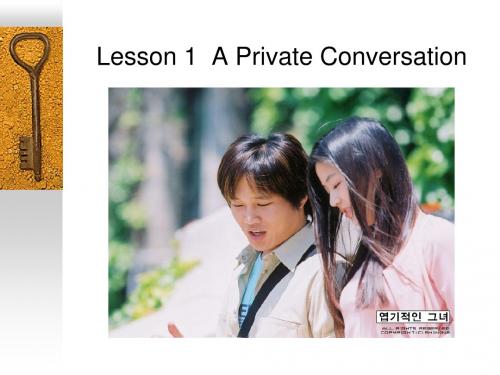
attention
[经典用法] pay attention to sb/sth
[比较学习]
notice
不用心去看 attention 用心去盯着 [口语应用] Attention, please! 请大家注意! Attention! 立正! At ease! 放松!
1. Last week I went to the theatre.
[参考翻译] 上个星期,我去了戏院看戏。
[语言点1] 时间状语开门见山,过去的时
间用过去时态顺理成章。故将go改为 went。 [语言点2] 在theatre,cinema,pictures等词 之前一定要加定冠词the。
3. The play was very interesting.
[参考翻译] 那场戏剧演得非常有意
思。 [语言点] very 为副词,interesting为 形容词,副词修饰形容词一般放在 其前面。 比如: very hot非常热, quiet easy 十分简单,但good enough 为例外。
with sb I had a long conversation with my father yesterday afternoon. have a conversation about sth Shall we have a conversation about your vacation ?
例如:
go to the theatre = go to the play去看戏 go to the cinema 去看电影(英式英语) go to the movies 去看电影(美式英语) go to the pictures/films 去看电影 be at the theatre/cinema 在戏院看戏/在
Lesson 1 课文参考译文
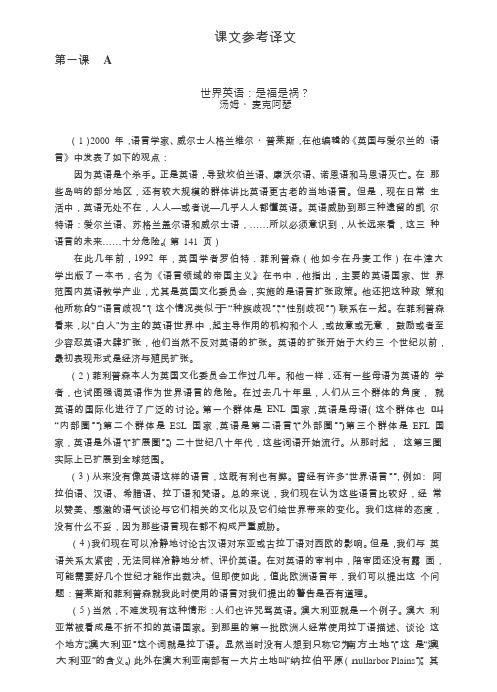
课文参考译文第一课A世界英语:是福是祸?汤姆·麦克阿瑟(1)2000 年,语言学家、威尔士人格兰维尔·普莱斯,在他编辑的《英国与爱尔兰的语言》中发表了如下的观点:因为英语是个杀手。
正是英语,导致坎伯兰语、康沃尔语、诺恩语和马恩语灭亡。
在那些岛屿的部分地区,还有较大规模的群体讲比英语更古老的当地语言。
但是,现在日常生活中,英语无处不在,人人—或者说—几乎人人都懂英语。
英语威胁到那三种遗留的凯尔特语:爱尔兰语、苏格兰盖尔语和威尔士语,……所以必须意识到,从长远来看,这三种语言的未来……十分危险。
(第141 页)在此几年前,1992 年,英国学者罗伯特.菲利普森(他如今在丹麦工作)在牛津大学出版了一本书,名为《语言领域的帝国主义》。
在书中,他指出,主要的英语国家、世界范围内英语教学产业,尤其是英国文化委员会,实施的是语言扩张政策。
他还把这种政策和他所称的“语言歧视”(这个情况类似于“种族歧视”、“性别歧视”)联系在一起。
在菲利普森看来,以“白人”为主的英语世界中,起主导作用的机构和个人,或故意或无意,鼓励或者至少容忍英语大肆扩张,他们当然不反对英语的扩张。
英语的扩张开始于大约三个世纪以前,最初表现形式是经济与殖民扩张。
(2)菲利普森本人为英国文化委员会工作过几年。
和他一样,还有一些母语为英语的学者,也试图强调英语作为世界语言的危险。
在过去几十年里,人们从三个群体的角度,就英语的国际化进行了广泛的讨论。
第一个群体是ENL 国家,英语是母语(这个群体也叫“内部圈”);第二个群体是ESL 国家,英语是第二语言(“外部圈”);第三个群体是EFL 国家,英语是外语(“扩展圈”)。
二十世纪八十年代,这些词语开始流行。
从那时起,这第三圈实际上已扩展到全球范围。
(3)从来没有像英语这样的语言,这既有利也有弊。
曾经有许多“世界语言”,例如:阿拉伯语、汉语、希腊语、拉丁语和梵语。
总的来说,我们现在认为这些语言比较好,经常以赞美、感激的语气谈论与它们相关的文化以及它们给世界带来的变化。
lesson 1 课文翻译和词汇

brigade (n.): a group of people organized to function。。"unit in some work(组织起来执行某种任务的)队
scramble (v.): climb,crawl,or clamber hurriedly爬行;攀(登)
sanctuary (n.): a place of refuge or protection:asylum 避难所,庇护所 cedar (n.): any of a genus of widespreading coniferous trees of the pine family,having clusters of needlelike leaves,cones, and durable wood with a characteristic fragrance雪松(属)
和枕头给几个小一点的孩子。他想把全家人都集中在同一层楼上。"不要靠近窗户!"他警告说,担心在飓风巾震破的玻璃碎片会飞来伤人。风凶猛地咆哮起来?屋子开始漏雨了……那雨水好像能穿墙透壁,往屋里直灌。一家人都操起拖把、毛巾、盆罐和水桶,展l开了一场排水战。到八点半钟,电没有了。柯夏克老爹便启动了小发电机。
【外语课件】Lesson 1高级英语课程教案第一册

Reference Books
附页
Text Book
Title
《高级英语》由张汉熙主编, 外语教学与研究出版社
Unit 1 The Middle Eastern Bazaar Warming-up Activities
Elicit some information about the Middle East.
Text Book
Title
《高级英语》由张汉熙主编, 外语教学与研究出版社
Unit 1 The Middle Eastern Bazaar Teaching Activities (Vocabulary)
In enriching students’ vocabulary, focuses are to be on the following aspects: Spelling and Pronunciation Synonyms Opposites Similar words and expressions Cultivate students’ sensitiveness to world-building 附页
1
4. Special Difficulties IV. Questions
Assignment
Describe the market nearby the school. 1. 2. 3. 4. 5. 6. 7. Longman Dictionary of Contemporary English A Handbook of Writing English Rhetoric & Writing Oxford Advanced Learner’s Dictionary of Current English 英语修辞大全》 《英语修辞大全》 A Guide to Advanced English Britannia Encyclopedia
新概念1 lesson 1
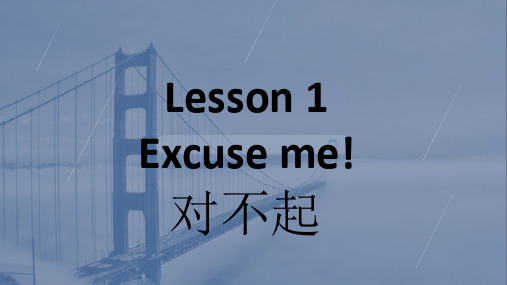
形容词性物主代词:表示一种所属关系。
对应汉语里面的“我的”“我们的”“你的”“你 们的”“ta的”“ta们的”
使用形容词性物主代词
你的短裙: your skirt 我的钢笔: my pen
Is this your handbag?
指示代词this:这,这里 th: [ð] 句型This is... :这是... e.g. This is a car. 这是一辆小汽车。
a lot: 非常地,十分地
Review
1. Excuse & sorry
2. handbag(失去爆破)
3. 人称代词主格,宾格,形容词性物主代词
主格
宾格
形容词性物主代词
I
me
my
we
us
our
you
you
your
he
him
his
she
her
her
it
it
its
they
them
their
4. This is.../ Is this...?
Is this your...? 这是你的...?
pen 钢笔 pencil 铅笔 book 书 watch 手表
dress 连衣裙 car 小汽车 house 二人称:you 第三人称:
he,she,it,they
宾格 me, us you
him,her,it,them
e.g. Glad to meet you.
ɡlad:adj.高兴的 [ɡlæd] Glad to [d] [t]失去爆破
pardon
int. interjection: 感叹词
int.原谅,请 常用在以下情况中: 再说一遍 有人跟你说话,你没
新概念英语第二册Lesson1课件
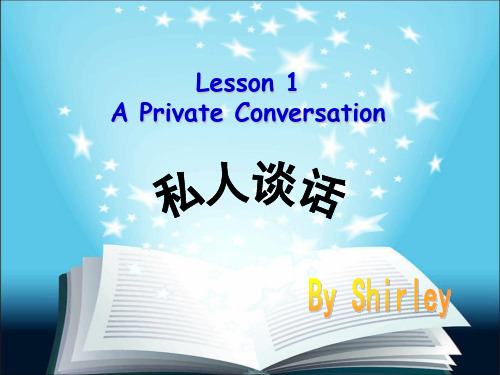
I could not hear the actors.
Key structures and usage
过去进行时:过去某个时间正在进行 或发生的动作 A young and a young woman were sitting behind me.
They were talking loudly.
• • • • • • • • • • • • • • •
【Key structures】 简单陈述句的语序 陈述句一定是有主语,有动词,有宾语,有句号 6 1 2 3 4 5 6 when? Who? Action Who? How? Where? When? Which? Which? What? What? 1 ---主语,一般由名词、代词或名词短语构成,通常位于动词之前,动词必 须与主语一致,即主语决定动词的单复数形式 2 ---谓语,由动词充当 3 ---宾语,一般为名词、代词或名词短语 4 ---副词或介词短语,对方式或状态提问,往往做状语 I like her very much 5 ---地点状语,一般在方式副词之后,时间副词之前 6 ---时间状语,可以放在句首或句末 简单陈述句一定不能少的是主语, 谓语. 如果问何时何地,是一个固定搭配 when and where
• • • • • •
★business n. 事, 生意 ① n. 生意 business man :生意人 do business: 做生意 ② n. 某人自己的私人的事情 It's my business. (指私人的事, 自己处理的 事) • It's none of your business. 不关你的事。
Language points
以下短语中名词前不加冠词:
lesson 1
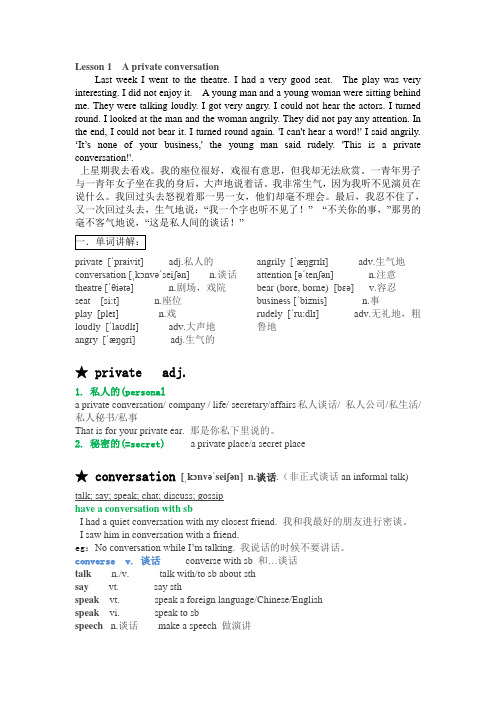
Lesson 1 A private conversationLast week I went to the theatre. I had a very good seat. The play was very interesting. I did not enjoy it. A young man and a young woman were sitting behind me. They were talking loudly. I got very angry. I could not hear the actors. I turned round. I looked at the man and the woman angrily. They did not pay any attention. In the end, I could not bear it. I turned round again. 'I can't hear a word!' I said angrily. ‘It’s none of your business,' the young man said rude ly. 'This is a private conversation!'.上星期我去看戏。
我的座位很好,戏很有意思,但我却无法欣赏。
一青年男子与一青年女子坐在我的身后,大声地说着话。
我非常生气,因为我听不见演员在说什么。
我回过头去怒视着那一男一女,他们却毫不理会。
最后,我忍不住了,又一次回过头去,生气地说:“我一个字也听不见了!” “不关你的事,”那男的毫不客气地说,“这是私人间的谈话!”private [ˈpraivit] adj.私人的conversation [ˌkɔnvəˈseiʃən] n.谈话theatre [ˈθiətə] n.剧场,戏院seat [si:t] n.座位play [pleɪ] n.戏loudly [ˈlaʊdlɪ] adv.大声地angry [ˈæŋɡri]adj.生气的angrily [ˈæŋgrɪlɪ] adv.生气地attention [əˈtenʃən] n.注意bear (bore, borne) [bɛə] v.容忍business [ˈbiznis] n.事rudely [ˈru:dlɪ] adv.无礼地,粗鲁地★ private adj.1. 私人的(personala private conversation/ company / life/ secretary/affairs私人谈话/ 私人公司/私生活/私人秘书/私事That is for your private ear.那是你私下里说的。
新概念英语第一册Lesson 1
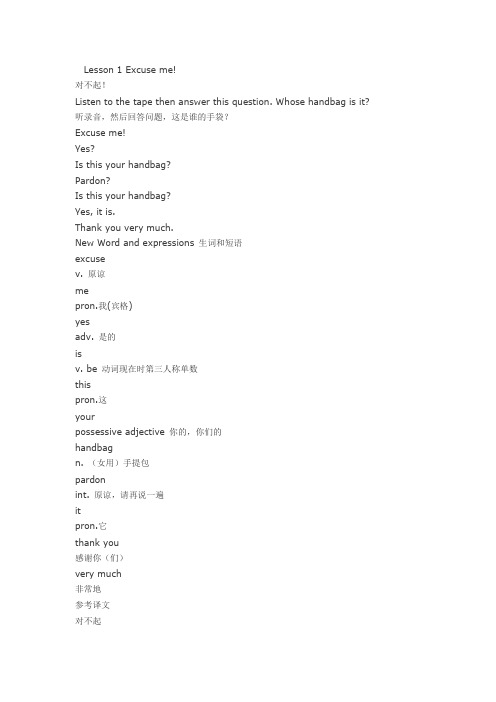
Lesson 1 Excuse me!对不起!Listen to the tape then answer this question. Whose handbag is it? 听录音,然后回答问题,这是谁的手袋?Excuse me!Yes?Is this your handbag?Pardon?Is this your handbag?Yes, it is.Thank you very much.New Word and expressions 生词和短语excusev. 原谅mepron.我(宾格)yesadv. 是的isv. be 动词现在时第三人称单数thispron.这yourpossessive adjective 你的,你们的handbagn. (女用)手提包pardonint. 原谅,请再说一遍itpron.它thank you感谢你(们)very much非常地参考译文对不起什么事?这是您的手提包吗?对不起,请再说一遍。
这是您的手提包吗?是的,是我的。
非常感谢!自学导读Excuse me!这是常用于表示道歉的客套话,相当于汉语中的"劳驾"、"对不起"。
当我们要引起别人的注意、要打搅别人或打断别人的话时,通常都可使用这一表达方式。
在课文中,男士为了吸引女士的注意而使用了这句客套话。
它也可用在下列场合:向陌生人问路,借用他人的电话,从别人身边挤过,在宴席或会议中途要离开一会儿等等。
2.Yes?什么事?课文中的Yes?应用升调朗读,意为:"什么事?"Yes?以升调表示某种不肯定或询问之意,也含有请对方说下去的意思。
3.Pardon?对不起,请再说一遍。
当我们没听清或没理解对方的话并希望对方能重复一遍时,就可以使用这一表达方式。
较为正式的说法是:I beg your pardon.I beg your pardon?Pardon me.它们在汉语中的意思相当于"对不起,请再说一遍"或者"对不起,请再说一遍好吗?" 4.Thank you very much.非常感谢!这是一句表示感谢的用语,意为"非常感谢(你)"。
Lesson 1
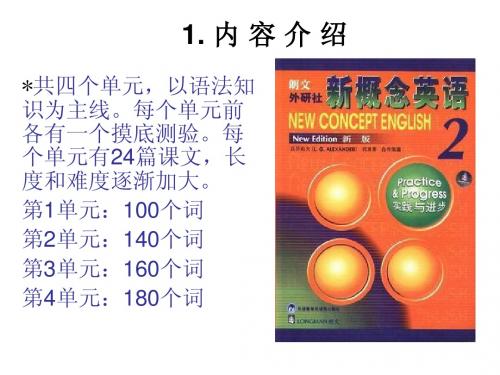
[经典用法] be angry with sb 生某人的气 be angry at / about sth 为某事而生气 be angry at sb for …因…生某人的气 make sb angry 让某人生气
链接词汇:angrily 生气地
[扩充学习]
cross 生气的 angry 生气的 (英式) mad 气的发疯 (美式) be blue in the face 气得发紫 feel hot under the collar 气得胸口发闷
Lesson 1
A private conversation
Helen
New words:
private adj. 私人的 conversation n.谈话 theatre n. 剧场,戏院 seat n. 座位 play n. 戏 loudly adv. 大声地
conversation n.谈话,会谈,商讨 conversation room 谈话室 in conversation with (在)和…谈话 同义:have a talk with… / have a word with… / have a chat with 与…谈话 eg: I had a long conversation with my
[参考翻译] 上个星期,我去了戏院看戏。 [语言点1] 时间状语开门见山,过去的时间 用过去时态顺理成章。故将go改为 went。 [语言点2] 在theatre,cinema,pictures等词之 前一定要加定冠词the。
例如: go to the theatre = go to the play去看戏 go to the cinema 去看电影(英式英语) go to the movies 去看电影(美式英语) go to the pictures/films 去看电影 be at the theatre/cinema 在戏院看戏/在电 影院看电影
lesson1

Do you ever watch too much TV? How much time do you spend watching TV every day? Point out what kinds of TV programme they are. music programmes
What does a couch potato refer to? A couch potato is someone who
watches lots (some would say too
much! ) of television. “沙发马铃薯”。它不是马铃薯的 变种, 而是现代社会里的产物, 指浪 费太多时间看电视的人。
2. What do you think “You’ve got the world at your feet” means? It means that you are able to know what is going on around the world through the TV. With the control,
get home late; bring back;
have no time with family; complain about
You work too hard! You may need more time to enjoy your life with your family.
Consolidation-Listening
最全新概念英语第一册单词(word完整版)
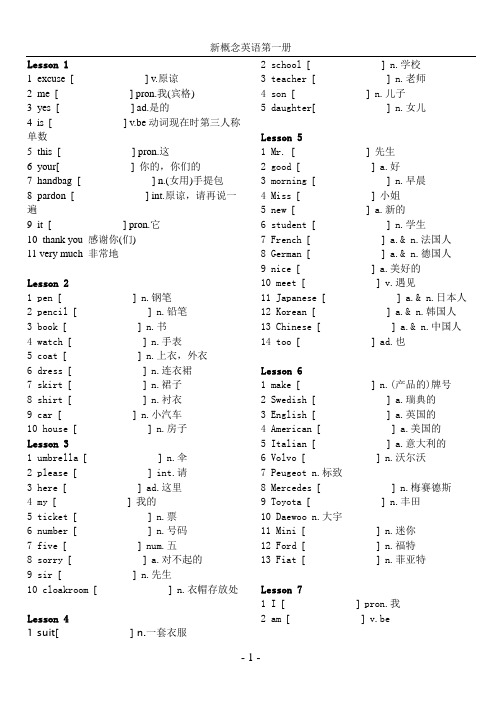
Lesson 11excuse[ ] v.原谅2me[ ] pron.我(宾格)3yes[ ] ad.是的4is[ ] v.be动词现在时第三人称单数5this[ ] pron.这6your[ ] 你的,你们的7handbag[ ] n.(女用)手提包8pardon[ ] int.原谅,请再说一遍9it[ ] pron.它10thank you感谢你(们)11 very much非常地Lesson 21 pen [ ] n.钢笔2 pencil [ ] n.铅笔3 book [ ] n.书4 watch [ ] n.手表5 coat [ ] n.上衣,外衣6 dress [ ] n.连衣裙7 skirt [ ] n.裙子8 shirt [ ] n.衬衣9 car [ ] n.小汽车10 house [ ] n.房子Lesson 31 umbrella [ ] n.伞2 please [ ] int.请3 here [ ] ad.这里4 my [ ]我的5 ticket [ ] n.票6 number [ ] n.号码7 five [ ] num.五8 sorry [ ] a.对不起的9 sir [ ] n.先生10 cloakroom [ ] n.衣帽存放处Lesson 41 suit[ ] n.一套衣服2 school [ ] n.学校3 teacher [ ] n.老师4 son [ ] n.儿子5 daughter[ ] n.女儿Lesson 51 Mr. [ ]先生2 good [ ] a.好3 morning [ ] n.早晨4 Miss [ ]小姐5 new [ ] a.新的6 student [ ] n.学生7 French [ ] a.& n.法国人8 German [ ] a.& n.德国人9 nice [ ] a.美好的10 meet [ ] v.遇见11 Japanese [ ] a.& n.日本人12 Korean [ ] a.& n.韩国人13 Chinese [ ] a.& n.中国人14 too [ ] ad.也Lesson 61 make [ ] n.(产品的)牌号2 Swedish [ ] a.瑞典的3 English [ ] a.英国的4 American [ ] a.美国的5 Italian [ ] a.意大利的6 Volvo [ ] n.沃尔沃7 Peugeot n.标致8 Mercedes [ ] n.梅赛德斯9 Toyota [ ] n.丰田10 Daewoo n.大宇11 Mini [ ] n.迷你12 Ford [ ] n.福特13 Fiat [ ] n.菲亚特Lesson 71 I [ ] pron.我2 am [ ] v.be动词现在时第一人称单数3 are [ɑ:] v.be动词现在时复数4 name ['neim] n.名字5 what [wɔt, wɑ:t] a.& pron.什么6 nationality [ˌnæʃə'næliti] n.国籍7 job [dʒɔb] n.工作8 keyboard ['ki:bɔ:d] n.电脑键盘9 operator ['ɔpəreitə] n.操作人员10 engineer [ˌendʒi'niə] n.工程师Lesson 81 policeman [pə'li:smən] n.警察2 policewoman [pə'li:s,wumən] n.女警察3 taxi driver 出租汽车司机4 air hostess 空中小姐5 postman ['pəustmən] n.邮递员6 nurse [nə:s] n.护士7 mechanic [mi'kænik] n.机械师8 hairdresser ['heəˌdresə] n.理发师9 housewife ['hauswaif] n.家庭妇女10 milkman ['milkmən] n.送牛奶的人Lesson 91 hello [hə'ləu] int.喂(表示问候)2 hi [hai] int.喂,嗨3 how [hau] ad.怎样4 today [tə'dei] ad.今天5 well [wel] a.身体好6 fine [fain] a.美好的7 thanks [θæŋks] int.谢谢8 goodbye [ˌgud'bai] int.再见9 see [si:] v.见Lesson 101 fat [fæt] a.胖的2 woman ['wumən] n.女人3 thin [θin] a.瘦的4 tall [tɔ:l] a.高的5 short [ʃɔ:t] a.矮的6 dirty ['də:ti] a.脏的7 clean [kli:n] a.干净的8 hot [hɔt] a.热的9 cold [kəuld] a.冷的10 old [əuld] a.老的11 young [jʌŋ] a.年轻的12 busy ['bizi] a.忙的13 lazy ['leizi] a.懒的Lesson 111 whose [hu:z] pron.谁的2 blue [blu:] a.蓝色的3 perhaps [pə'hæps] ad.大概4 white [wait] a.白色的5 catch [kætʃ] v.抓住Lesson 121 father ['fɑ:ðə] n.父亲2 mother ['mʌðə] n.母亲3 blouse [blauz] n.女衬衫4 sister [sistə] n.姐,妹5 tie [tai] n.领带6 brother ['brʌðə] n.兄,弟7 his [hiz]他的8 her [hə:]她的Lesson 131 colour ['kʌlə] n.颜色2 green [gri:n] a.绿色3 come [kʌm] v.来4 upstairs [ˌʌp'steəz] ad.楼上5 smart [smɑ:t] a.时髦的,巧妙的6 hat [hæt] n.帽子7 same [seim] a.相同的8 lovely ['lʌvli] a.可爱的,秀丽的Lesson 141 case [keis] n. 箱子2 carpet ['kɑ:pit] n. 地毯3 dog [dɔg] n. 狗Lesson 151 Customs ['kʌstəmz] n. 海关2 officer ['ɔfisə] n. 官员3 girl [gə:l] n. 女孩,姑娘4 Danish ['deiniʃ] a.& n. 丹麦人5 friend ['deiniʃ] a.& n. 丹麦人6 Norwegian [nɔ:'wi:dʒən] a.& n. 挪威人7 passport['pɑ:spɔ:t] n.护照8 brown[braun] a. 棕色的9 tourist ['tuərist] n. 旅游者Lesson 161 Russian ['rʌʃən] a.& n. 俄罗斯人2 Dutch [dʌtʃ] a.& n. 荷兰人3 these [ði:z] pron. 这些(this的复数)4 red [red] a. 红色的5 grey [grei] a. 灰色的6 yellow ['jeləu] a. 黄色的7 black [blæk] a. 黑色的8 orange ['ɔrindʒ] a. 橘黄色的Lesson 171 employee [im'plɔi-i:] n.雇员2 hard-working ['hɑ:dwə:kiŋ] a. 勤奋的3 sales reps 推销员4 man [mæn] n. 男人5 office ['ɔfis] n. 办公室6 assistant [ə'sistənt] n. 助手Lesson 191 matter ['mætə] n. 事情2 children ['tʃildrən] n. 孩子们(child 的复数)3 tired ['taiəd] a. 累,疲乏4 boy [bɔi] n. 男孩5 thirsty ['θə:sti] a. 渴6 mum ['mʌm] n. 妈妈(儿语)7 sit down [ˌsit'daun] 坐下8 right [rait] a. 好,可以9 ice cream [ˌais'kri:m] 冰淇淋Lesson 201 big [big] a.大的2 small [smɔ:l] a.小的3 open ['əupən] a.开着的4 shut [ʃʌt] a.关着的5 light [lait] a.轻的6 heavy ['hevi] a.重的7 long [lɔŋ] a.长的8 shoe [ʃu:] n.鞋子9 grandfather ['grændˌfɑ:ðə] n.祖父,外祖父10 grandmother ['grænˌmʌðə] n.祖母,外祖母Lesson 211 give [giv] v. 给2 one [wʌn] pron. 一个3 which [witʃ] 哪一个Lesson 221 empty ['empti] a.空的2 full [ful] a.满的3 large [lɑ:dʒ] a.大的4 little ['litl] a.小的5 sharp [ʃɑ:p] a.尖的,锋利的6 small [smɔ:l] a.小的7 big [big] a.大的8 blunt [blʌnt] a.钝的9 box [bɔks] n.盒子,箱子10 glass [glɑ:s] n.杯子11 cup [kʌp] n.茶杯12 bottle ['bɔtl] n.瓶子13 tin [tin] n.罐头14 knife [naif] n.刀子15 fork [fɔ:k] n.叉子Lesson 231 on [ɔn] prep. 在…之上2 shelf [ʃelf] n. 架子,搁板Lesson 241 desk [desk] n.课桌2 table ['teibəl] n.桌子3 plate [pleit] n.盘子4 cupboard ['kʌbəd] n.食橱5 cigarette [ˌsigə'ret] n.香烟6 television ['teliˌviʒən, ˌteli'viʒən] n.电视机7 floor [flɔ:] n.地板8 dressing table 梳妆台9 magazine [ˌmægə'zi:n] n.杂志10 bed [bed] n.床11 newspaper ['nju:sˌpeipə] n.报纸12 stereo ['steriəu, 'stiər-] n.立体声音响Lesson 251 Mrs. ['misiz]夫人2 kitchen ['kitʃin] n.厨房3 refrigerator [ri'fridʒəreitə] n.电冰箱4 right [rait] n.右边5 electric [i'lektrik] a.带电的,可通电的6 left [left] n.左边7 cooker ['kukə] n.炉子,炊具8 middle ['midl] n.中间9 of [əv, ə, ɔv] prep.(属于)…的10 room [ru:m] n.房间11 cup [kʌp] n.杯子Lesson 261 where [weə] ad.在哪里2 in [in] prep.在…里Lesson 271 living room ['liviŋ ru:m]客厅2 near [niə] prep.靠近3 window ['windəu] n.窗户4 armchair ['ɑ:mtʃeə] n.手扶椅5 door [dɔ:] n.门6 picture ['piktʃə] n.图画7 wall [wɔ:l] n.墙Lesson 281 trousers ['trauzəz] n.〔复数〕长裤Lesson 291 shut [ʃʌt] v.关门2 bedroom ['bedrum, -ru:m] n.卧室3 untidy [ˌʌn'taidi] a.乱,不整齐4 must [mʌst] modal verb.必须,应该5 open ['əupən] v.打开6 air [eə] v.使…通风,换换空气7 put [put] v.放置8 clothes [kləuðz] n.衣服9 wardrobe ['wɔ:drəub] n.大衣柜10 dust [dʌst] v.掸掉灰尘11 sweep [swi:p] v.扫Lesson 301 empty ['empti] v.倒空,使…变空2 read [ri:d] v.读3 sharpen ['ʃɑ:pən] v.削尖,使锋利4 put on [ˌput'ɔn]穿上5 take off 脱掉6 turn on [tə:n ɔn]开(电灯)7 turn off 关(电灯)Lesson 311 garden ['gɑ:dn] n.花园2 under ['ʌndə] prep.在…之下3 tree [tri:] n.树4 climb [klaim] v.爬,攀登5 who [hu:] pron.谁6 run [rʌn] v.跑7 grass [grɑ:s] n.草,草地8 after ['ɑ:ftə] prep.在…之后9 cat [kæt] n.猫Lesson 321 type [taip] v.打字2 letter ['letə] n.信3 basket ['bɑ:skit] n.篮子4 eat [i:t] v.吃5 bone [bəun] n.骨头6 clean [kli:n] v.清洗7 tooth [tu:θ] n.牙齿8 cook [kuk] v.做(饭菜)9 milk [milk] n.牛奶10 meal [mi:l] n.饭,一顿饭11 drink [dr iŋk] v.喝12 tap [tæp] n.(水)龙头Lesson 331 day [dei] n.日子15 fly [flai] v.飞2 cloud [klaud] n.云3 sky [skai] n.天空4 sun [sʌn] n.太阳5 shine [ʃain] v.照耀6 with [wið, wiθ] prep.和…在一起7 family ['fæməli] n.家庭(成员)8 walk [wɔ:k] v.走路,步行9 over ['əuvə] prep.跨越,在…之上10 bridge [bridʒ] n.桥11 boat [bəut] n.船12 river ['rivə] n.河13 ship [ʃip] n.轮船14 aeroplane ['eərəplein] n.飞机Lesson 341 sleep [sli:p] v.睡觉2 shave [ʃeiv] v.刮脸3 cry [krai] v.哭,喊4 wash [wɔʃ] v.洗5 wait [weit] v.等6 jump [dʒʌmp] v.跳Lesson 351 photograph ['fəutəgrɑ:f] n.照片2 village ['vilidʒ] n.村庄3 valley ['væli] n.山谷4 between [bi'twi:n] prep.在…之间5 hill [hil] n.小山6 another [ə'nʌðə] prep.另一个7 wife [waif] n.妻子8 along [ə'lɔŋ] prep.沿着9 bank [bæŋk] n.河岸10 water ['wɔ:tə] n.水11 swim [swim] v.游泳12 across [ə'krɔs] prep.横过13 building ['bildiŋ] n.大楼,建筑物14 park [pɑ:k] n.公园15 into ['intu, 'intə] prep.进入Lesson 361 beside [bi'said] prep.在…旁2 off [ɔf] prep.离开Lesson 371 work [wə:k] v.工作2 hard ['hɑ:d] ad.努力地3 make [meik] v.做4 bookcase ['buk-keis] n.书橱,书架5 hammer ['hæmə] n.锤子6 paint [peint] v.上漆,涂7 pink [piŋk] n.& a.粉红色8 favourite ['feivərit] a.最喜欢的Lesson 381 homework ['həumwə:k] n.作业2 listen ['lisən] v.听3 dish [diʃ] n.盘子,碟子Lesson 391 front [frʌnt] n.前面2 in front of 在…之前3 careful ['keəful] a.小心的,仔细的4 vase [vɑ:z, veis, veiz] n.花瓶5 drop [drɔp] v.掉下6 flower ['flauə] n.花Lesson 401 show [ʃəu] v.给…看2 send [send] v.送给3 take [teik] v.带给Lesson 411 cheese [tʃi:z] n.乳酪,干酪2 bread [bred] n.面包3 soap [səup] n.肥皂4 chocolate ['tʃɔklit] n.巧克力5 sugar ['ʃugə] n.糖6 coffee ['kɔfi] n.咖啡7 tea [ti:] n.茶8 tobacco [tə'bækəu] n.烟草,烟丝9.loaf /ləuf/ 块10. certainly ['sə:tənli] ad.当然Lesson 421 bird [bə:d] n.鸟2 any ['eni] det.一些3 some [sʌm] det.一些Lesson 431 of course [əv'kɔ:s]当然2 kettle ['ketl] n.水壶3 behind [bi'haind] prep.在…后面4 teapot ['ti:pɔt] n.茶壶5 now [nau] ad.现在,此刻6 find [faind] v.找到7 boil [bɔil] v.沸腾,开Lesson 451 can [kæn]能够2 boss [bɔs] n.老板,上司3 minute ['minit, mai'nju:t] n.分(钟)4 ask [ɑ:sk] v.请求,要求5 handwriting ['hændˌraitiŋ] n.书写6 terrible ['terəbəl] a.糟糕的,可怕的Lesson 461 lift [lift] v.拿起,搬起,举起2 cake [keik] n.饼,蛋糕3 biscuit ['biskit] n.饼干Lesson 471 like [laik] v.喜欢,想要2 want [wɔnt, wɑ:nt] v.想Lesson 481 fresh [freʃ] a.新鲜的2 egg [eg] n.鸡蛋3 butter ['bʌtə] n.黄油4 pure [pjuə] a.纯净的5 honey ['hʌni] n.蜂蜜6 ripe [raip] a.成熟的7 banana [bə'nɑ:nə] n.香蕉8 jam [dʒæm] n.果酱9 sweet [swi:t] a.甜的10 orange ['ɔrindʒ] n.橙11 Scotch whisky 苏格兰威士忌12 choice [tʃɔis] a.上等的,精选的13 apple ['æpəl] n.苹果14 wine [wain] n.酒,果酒15 beer [biə] n.啤酒16 blackboard ['blækbɔ:d] n.黑板Lesson 491 butcher ['butʃə] n.卖肉的2 meat [mi:t] n.(食用)肉3 beef [bi:f] n.牛肉4 lamb [læm] n.羔羊肉5 husband ['hʌzbənd] n.丈夫6 steak [steik] n.牛排7 mince [mins] n.肉馅,绞肉8 chicken ['tʃikin] n.鸡9 tell [tel] v.告诉10 truth [tru:θ] n.实情11 either ['aiðə] ad.也(用于否定句)Lesson 501 tomato [tə'mɑ:təu] n.西红柿2 potato [pə'teitəu] n.土豆3 cabbage ['kæbidʒ] n.卷心菜4 lettuce ['letis] n.莴苣5 pea [pi:] n.豌豆6 bean [bi:n] n.豆角7 pear [peə] n.梨8 grape [greip] n.葡萄9 peach [pi:tʃ] n.桃Lesson 511 Greece [gri:s] n.希腊2 climate ['klaimit] n.气候3 country ['kʌntri] n.国家4 pleasant ['plezənt] a.宜人的5 weather ['weðə] n.天气6 spring [spriŋ] n.春季7 windy ['windi] a.有风的8 warm [wɔ:m] a.温暖的9 rain [rein] v.下雨10 sometimes ['sʌmtaimz] ad.有时11 summer ['sʌmə] n.夏天12 autumn ['ɔ:təm] n.秋天13 winter ['wintə] n.冬天14 snow [snəu] v.下雪15 January ['dʒænjuəri] n.1月16 February ['februəri] n.2月17 March [mɑ:tʃ] n.3月18 April ['eiprəl] n.4月19 May [mei] n.5月20 June [dʒu:n] n.6月21 July [dʒu'lai] n.7月22 August ['ɔ:gəst] n.8月23 September [sep'tembə] n.9月24 October [ɔk'təubə] n.10月25 November [nəu'vembə] n.11月26 December [di'sembə] n.12月Lesson 521 the U.S. 美国2 Brazil [brə'zil] n.巴西3 Holland ['hɔlənd] n.荷兰4 England ['iŋglənd] n.英国5 France ['fræns] n.法国6 Germany ['dʒə:məni] n.德国7 Italy ['itəli] n.意大利8 Norway ['nɔ:wei] n.挪威9 Russia ['rʌʃə] n.俄罗斯10 Spain [spein] n.西班牙11 Sweden ['swi:dn] n.瑞典Lesson 531 mild [maild] a.温和的,温暖的2 always ['ɔ:lweiz] ad.总是3 north [nɔ:θ] n.北方4 east [i:st] n.东方5 wet [wet] a.潮湿的6 west [west] n.西方7 south [sauθ] n.南方8 season ['si:zən] n.季节9 best [best] ad.最10 night [nait] n.夜晚11 rise [raiz] v.升起12 early ['ə:li] ad.早13 set [set] v.(太阳)落下去14 late [leit] ad.晚,迟15 interesting ['intristiŋ] a.有趣的,有意思的16 subject ['sʌbdʒikt] n.话题17 conversation [‘kɔnvə'seiʃən] n.谈话Lesson 541 Australia [ɔ'streiliə] n.澳大利亚2 Australian [ɔ'streiliən] n.澳大利亚人3 Austria ['ɔstriə] n.奥地利4 Austrian ['ɔstriən] n.奥地利人5 Canada ['kænədə] n.加拿大6 Canadian [kə'neidiən] n.加拿大人7 China ['tʃainə] n.中国8 Finland ['finlənd] n.芬兰9 Finnish ['finiʃ] n.芬兰人10 India ['indiə] n.印度11 Indian ['indiən] n.印度人12 Japan [dʒə'pæn] n.日本13 Nigeria [nai'dʒiəriə] n.尼日利亚14 Nigerian [nai'dʒiəriən] n.尼日利亚人15 Turkey ['tə:ki] n.土耳其16 Turkish ['tə:kiʃ] n.土耳其人17 Korea [kə'riə, kɔ(:)'riə] n.韩国18 Polish ['pəuliʃ] n.波兰人19 Poland ['pəulənd] n.波兰20 Thai [tai] n.泰国人21 Thailand ['tailænd] n.泰国Lesson 551 live [liv] v.住,生活2 stay [stei] v.呆在,停留3 home [həum] n.家 ad.在家,到家4 housework ['hauswə:k] n.家务5 lunch [lʌntʃ] n.午饭6 afternoon [ˌɑ:ftə'nu:n] n.下午7 usually ['ju:ʒuəli, 'ju:ʒəli] ad.通常8 together [tə'geðə] ad.一起9 evening ['i:vniŋ] n.晚上10 arrive [ə'raiv] v.到达11 night [nait] n.夜间Lesson 571 o'clock [ə'klɔk] ad.点钟2 shop [ʃɔp] n.商店3 moment ['məumənt] n.片刻,瞬间Lesson 591 envelope ['envələup] n.信封2 writing paper 信纸3 shop assistant 售货员4 size [saiz] n.尺寸,尺码,大小5 pad [pæd] n.信笺簿6 glue [glu:] n.胶水7 chalk [tʃɔ:k] n.粉笔8 change [tʃeindʒ] n.零钱,找给的钱Lesson 611 feel [fi:l] v.感觉2 look [luk] v.看(起来)3 must [mʌst]必须4 call [kɔ:l] v.叫,请5 doctor ['dɔktə] n.医生6 telephone ['telifəun] n.电话7 remember [ri'membə] v.记得,记住8 mouth [mauθ] n.嘴9 tongue [tʌŋ] n.舌头10 bad [bæd] a.坏的,严重的11 cold [kəuld] n.感冒12 news [nju:z] n.消息13 headache ['hedeik] n.头痛14 aspirin ['æspərin] n.阿斯匹林15 earache ['iəreik] n.耳痛16 toothache ['tu:θeik] n.牙痛17 dentist ['dentist] n.牙医18 stomach ache 胃痛19 medicine ['medsən] n.药20 temperature ['tempərətʃə] n.温度21 flu [flu:] n.流行性感冒22 measles ['mi:zəlz] n.麻疹23 mumps [mʌmps] n.腮腺炎Lesson 631 better ['betə] a.形容词well的比较级2 certainly ['sə:tənli] ad.当然3 get up [get ʌp]起床4 yet [jet] ad.还,仍5 rich [ritʃ] a.油腻的6 food [fu:d] n.食物7 remain [ri'mein] v.保持,继续Lesson 641 play [plei] v.玩2 match [mætʃ] n.火柴3 talk [tɔ:k] v.谈话4 library ['laibrəri] n.图书馆5 drive [draiv] v.开车6 so [səu] ad.如此地7 quickly ['kwikli] ad.快地8 lean out of 身体探出9 break [breik] v.打破Lesson 651 Dad [dæd] n.爸(儿语)2 key [ki:] n.钥匙3 baby ['beibi] n.婴儿4 hear [hiə] v.听见5 enjoy [in'dʒɔi] v.玩得快活6 yourself [jə'self] pron.你自己7 ourselves [auə'selvz] pron.我们自己Lesson 661 myself [mai'self] pron.我自己2 themselves [ðəm'selvz]pron.他们自己3 himself [him'self] pron.他自己4 herself [hə:'self] pron.她自己Lesson 671 greengrocer['gri:nˌgrəusə] n.蔬菜水果零售商2 absent ['æbsənt, əb'sent] a.缺席的3 Monday ['mʌndi] n.星期一4 Tuesday ['tju:zdi:, 'tu:z-] n.星期二5 Wednesday ['wenzdi] n.星期三6 Thursday ['θə:zdi]星期四7 keep [ki:p] v.(身体健康)处于(状况)8 spend [spend] v.度过9 weekend ['wi:kend, ˌwi:k'end] n.周末10 Friday ['fraidi] n.星期五11 Saturday ['sætədi] n.星期六12 Sunday ['sʌndi] n.星期日13 country ['kʌntri] n.乡村14 lucky ['lʌki] a.幸运的Lesson 681 church [tʃə:tʃ] n.教堂2 dairy ['deəri] n.乳品店3 baker ['beikə] n.面包师傅4 grocer ['grəusə] n.食品杂货商Lesson 691 year [jiə, jə:] n.年2 race [reis] n.比赛3 town [taun] n.城镇4 crowd [kraud] n.人群5 stand [stænd] v.站立6 exciting [ik'saitiŋ] a.使人激动的7 just [dʒʌst] ad.正好,恰好8 finish ['finiʃ] n.结尾,结束9 winner ['winə] n.获胜者10 behind [bi'haind] prop.在…之后11 way [wei] n.路途Lesson 711 awful ['ɔ:ful] ad.让人讨厌的,坏的2 telephone ['telifəun] v.& n.打电话3 time [taim] n.次(数)4 answer ['ɑ:nsə] v.接(电话)5 last [lɑ:st] a.最后的,前一次的6 phone [fəun] n.电话(=telephone)7 again [ə'gein] ad.又一次地8 say [sei] v.说Lesson 731 week [wi:k] n.周2 London ['lʌndən] n.伦敦3 suddenly ['sʌdnli] ad.突然地4 bus stop ['bʌstɔp]公共汽车车站5 smile [smail] v.微笑6 pleasantly ['plezntli] ad.愉快地7 understand [ˌʌndə'stænd] v.懂,明白8 speak [spi:k] v.讲,说9 hand [hænd] n.手10 pocket ['pɔkit] n.衣袋11 phrasebook n.短语手册,常用语手册12 phrase [freiz] n.短语13 slowly ['sləuli] ad.缓慢地Lesson 741 hurriedly ['hʌridli] ad.匆忙地2 cut [kʌt] v.割,切3 thirstily ['θə:stili] ad.口渴地4 go [gəu] v.走5 greet [gri:t] v.问候,找招呼Lesson 751 ago [ə'gəu] ad.以前2 buy [bai] v.买3 pair [peə] n.双,对4 fashion ['fæʃən] n.(服装的)流行式样5 uncomfortable [ʌn'kʌmftəbəl] a.不舒服的6 wear [weə] v.穿着 woreLesson 771 appointment [ə'pɔintmənt] n.约会,预约2 urgent ['ə:dʒənt] a.紧急的,急迫的3 till [til] prep.直到…为止Lesson 791 shopping ['ʃɔpiŋ] n.购物2 list [list] n.单子3 vegetable ['vedʒtəbəl] n.蔬菜4 need [ni:d] v.需要5 hope [həup] v.希望6 thing [θiŋ] n.事情7 money ['mʌni] n.钱Lesson 801 groceries ['grəusəriz] n.食品杂货2 fruit [fru:t] n.水果3 stationery ['steiʃənəri, -neri] n.文具4 newsagent ['nju:zˌeidʒənt] n.报刊零售人5 chemist ['kemist] n.化剂师,化学家Lesson 811 bath [bɑ:θ] n.洗澡2 nearly ['niəli] ad.几乎,将近3 ready ['redi] a.准备好的,完好的4 dinner ['dinə] n.正餐,晚餐5 restaurant ['restərɔnt] n.饭馆,餐馆6 roast [rəust] a.烤的Lesson 821 breakfast ['brekfəst] n.早饭2 haircut ['heəkʌt] n.理发3 party ['pɑ:ti] n.聚会4 holiday ['hɔlidi] n.假日Lesson 831 mess [mes] n.杂乱,凌乱2 pack [pæk] v.包装,打包,装箱3 suitcase ['su:tkeis, 'sju:t] n.手提箱4 leave [li:v] v.离开5 already [ɔ:l'redi] ad.已经Lesson 851 Paris ['pæris] n.巴黎2 cinema ['sinimə] n.电影院3 film [film] n.电影4 beautiful ['bju:tifəl] a.漂亮的5 city ['siti] n.城市6 never ['nevə] ad.从来没有7 ever ['evə] ad.在任何时候Lesson 871 attendant [ə'tendənt] n.接待员2 bring [briŋ] v.带来,送来3 garage ['gærɑ:ʒ] n.车库,汽车修理厂4 crash [kræʃ] n.碰撞5 lamp-post [læmp pəust]灯杆6 repair [ri'peə] v.修理7 try [trai] v.努力,设法Lesson 891 believe [bi'li:v] v.相信,认为2 may [mei] (用于请求许可)可以3 how long 多长4 since [sins] prep.自从5 why [wai] ad.为什么6 sell [sel] v.卖,出售7 because [bi'kɔz] conj.因为8 retire [ri'taiə] v.退休9 cost [kɔst] v.花费10 pound [paund] n.英镑11 worth [wə:θ] prep.值…钱12 penny ['peni] n.便士Lesson 911 still [stil] ad.还,仍旧2 move [mu:v] v.搬家3 miss [mis] v.想念,思念4 neighbour ['neibə] n.邻居5 person ['pə:sn] n.人6 people ['pi:pl] n.人们7 poor [puə] a.可怜的Lesson 931 pilot ['pailət] n.飞行员2 return [ri'tə:n] v.返回3 New York ['nju: 'jɔ:k] n.纽约4 Tokyo ['təukjəu] n.东京5 Madrid [mə'drid] n.马德里6 fly [flai] v.飞行Lesson 941 Athens ['æθinz] n.雅典2 Berlin [bə:'lin] n.柏林3 Bombay [bɔm'bei] n.孟买4 Geneva [dʒi'ni:və] n.日内瓦5 Moscow ['mɔskəu] n.莫斯科6 Rome [rəum] n.罗马7 Seoul [səul] n.汉城8 Stockholm ['stɔkhoum] n.斯德哥尔摩9 Sydney ['sidni] n.悉尼Lesson 951 return [ri'tə:n] n.往返2 train [trein] n.火车3 platform ['plætfɔ:m] n.站台4 plenty ['plenti] n.大量5 bar [bɑ:] n.酒吧6 station ['steiʃən] n.车站,火车站7 catch [kætʃ] v.赶上8 miss [mis] v.错过Lesson 971 leave [li:v] v.遗留2 describe [di'skraib] v.描述3 zip [zip] n.拉链4 label ['leibəl] n.标签5 handle ['hændl] n.提手,把手6 address [ə'dres] n.地址7 pence [pens] n.penny的复数形式8 belong [bi'lɔŋ] v.属于Lesson 991 ow [au] int.哎哟2 slip [slip] v.滑倒,滑了一脚3 fall [fɔ:l] v.落下,跌倒4 downstairs [ˌdaun'steəz] ad.下楼5 hurt [hə:t] v.伤,伤害,疼痛6 back [bæk] n.背7 stand up 起立,站起来8 help [help] v.帮助9 at once [ət 'wʌns]立即10 sure [ʃuə] a.一定的,确信的11 X-ray ['eksrei] n.X光透视Lesson 1011 Scotland ['skɔtlənd] n.苏格兰(英国)2 card [kɑ:d] n.明信片3 youth [ju:θ] n.青年4 hostel ['hɔstəl] n.招待所,旅馆5 association [əˌsəusi'eiʃən] n.协会6 soon [su:n] ad.不久7 write [rait] v.写Lesson 1031 exam [ig'zæm] n.考试2 pass [pɑ:s] v.及格,通过3 mathematics [ˌmæθə'mætiks] n.数学4 question ['kwestʃən] n.问题5 easy ['i:zi] a.容易的6 enough [i'nʌf] ad.足够地7 paper ['peipə] n.考卷8 fail [feil] v.未及格,失败9 answer ['ɑ:nsə] v.回答10 mark [mɑ:k] n.分数11 rest [rest] n.其他的东西12 difficult ['difikəlt] a.困难的13 hate [heit] v.讨厌14 low [ləu] a.低的15 cheer [tʃiə] v.振作,振奋16 guy [gai] n.家伙,人17 top [tɔp] n.上方,顶部Lesson 1041 clever ['klevə] a.聪明的2 stupid ['stju:pid] a.笨的3 cheap [tʃi:p] a.便宜的4 expensive [ik'spensiv] a.贵的5 fresh [freʃ] a.新鲜的6 stale [steil] a.变馊的7 low [ləu] a.低的,矮的8 loud [laud] a.大声的9 high [hai] a.高的10 hard ['hɑ:d] a.硬的11 sweet [swi:t] a.甜的12 soft [sɔft] a.软的13 sour [sauə] a.酸的Lesson 1051 spell [spel] v.拼写2 intelligent[in'telidʒənt] a.聪明的,有智慧的3 mistake [mis'teik] n.错误4 present [pri'zent, 'prezənt] n.礼物5 dictionary ['dikʃənəri] n.词典Lesson 1061 carry ['kæri] v.携带2 correct [kə'rekt] v.改正,纠正Lesson 1071 madam ['mædəm] n.夫人,女士(对妇女的尊称)2 as well 同样3 suit [su:t, sju:t] v.适于4 pretty ['priti] a.漂亮的Lesson 1091 idea [ai'diə] n.主意2 a little 少许(用于不可数名词之前)3 teaspoonful ['ti:spu:nful] n.一满茶匙4 less [les] a.(little的比较级)校少的,更小的5 a few 几个(用于可数名词之前)6 pity ['piti] n.遗憾7 instead [in'sted] ad.代替8 advice [əd'vais] n.建议,忠告Lesson 1101 most [məust] a.(many,much的最高级)最多的2 least [li:st] a.(little的最高级)最小的,最少的3 best [best] a.(good的最高级)最好的4 worse [wə:s] a.(bad的比较级)更坏的5 worst [wə:st] a.(bad的最高级)最坏的Lesson 1111 model ['mɔdl] n.型号,式样2 afford [ə'fɔ:d] v.付得起(钱)3 deposit [di'pɔzit] n.预付定金4 instalment [in'stɔ:lmənt] n.分期付款5 price [prais] n.价格6 millionaire [ˌmiljə'neə] n.百万富翁7. pay paid paid 付Lesson 1131 conductor [kən'dʌktə] n.售票员2 fare [feə] n.车费,车票3 change [tʃeindʒ] v.兑换(钱)4 note [nəut] n.纸币5 passenger ['pæsindʒə] n.乘客6 none [nʌn] pron.没有任何东西7 neither ['naiðə, 'ni:ðə] ad.也不8 get off 下车9 tramp [træmp] n.流浪汉10 except [ik'sept] prep.除…外Lesson 1151 anyone['eniwʌn]pron.(用于疑问句,否定式)任何人2 knock [nɔk] v.敲,打3 everything ['evriθiŋ] pron.一切事物4 quiet ['kwaiət] a.宁静的,安静的5 impossible [im'pɔsəbəl] a.不可能的6 invite [in'vait] v.邀请7 anything ['eniθiŋ] pron.任何东西8 nothing ['nʌθiŋ] pron.什么也没有9 lemonade [ˌlemə'neid] n.柠檬水10 joke [dʒəuk] v.开玩笑Lesson 1161 asleep [ə'sli:p]a.睡觉,睡着(用作表语)2 glasses ['gla:siz] n.眼镜Lesson 1171 dining room 饭厅2 coin [kɔin] n.硬币3 mouth [mauθ] n.嘴4 swallow [swɔləu] v.吞下5 later ['leitə] ad.后来6 toilet ['tɔilit] n.厕所,盥洗室Lesson 1181 ring [riŋ] v.响 rang, rungLesson 1191 story ['stɔ:ri] n.故事2 happen ['hæpən] v.发生3 thief [θi:f] n.贼4 enter ['entə] v.进入5 dark [dɑ:k] a.黑暗的6 torch [tɔ:tʃ] n.手电筒7 voice [vɔis] n.(说话的)声音8 parrot ['pærət] n.鹦鹉Lesson 1201 exercise book 练习本Lesson 1211 customer ['kʌstəmə] n.顾客2 forget [fə'get] v.忘记3 manager ['mænidʒə] n.经理4 serve [sə:v] v.照应,服务,接待5 counter ['kauntə] n.柜台6 recognize ['rekəgnaiz] v.认识7. gentleman 绅士Lesson 1221 road [rəud] n.路Lesson 1231 during ['djuəriŋ] prep.在…期间2 trip [trip] n.旅行3 travel ['trævəl] v.旅行4 offer ['ɔfə] v.提供5 job [dʒɔb] n.工作6 guess [ges] v.猜7 grow [grəu] v.长,让…生长8 beard [biəd] n.(下巴上的)胡子,络腮胡子Lesson 1241 kitten ['kitn] n.小猫Lesson 1251 water ['wɔ:tə] v.浇水2 terribly ['terəbli] ad.非常3 dry [drai] a.干燥的,干的4 nuisance ['nju:səns] n.讨厌的东西或人5 mean [mi:n] v.意味着,意思是6 surprise [sə'praiz] n.惊奇,意外的事Lesson 1261 immediately [i'mi:diətli] ad.立即地Lesson 1271 famous ['feiməs] a.著名的2 actress ['æktris] n.女演员3 at least 至少4 actor ['æktə] n.男演员5 read [ri:d] v.通过阅读得知Lesson 1291 wave [weiv] v.招手2 track [træk] n.跑道3 mile [mail] n.英里4 overtake [ˌəuvə'teik] v.从后面超越,超车5 speed [spi:d]限速6 dream [dri:m] v.做梦,思想不集中7 sign [sain] n.标记,牌子8 driving licence ['draiviŋ 'laisəns]驾驶执照9 charge [tʃɑ:dʒ] v.罚款10 darling ['dɑ:liŋ] n.亲爱的(用作表示称呼)Lesson 1311 Egypt ['i:dʒipt] n.埃及2 abroad [ə'brɔ:d] ad.国外3 worry ['wʌri] v.担忧Lesson 1331 reporter [ri'pɔ:tə] n.记者sensational [sen'seiʃənəl]a.爆炸性的,耸人听闻的3 mink coat ['miŋk-kəut]貂皮大衣Lesson 1351 future ['fju:tʃə] n.未来的2 get married 结婚3 hotel [həu'tel] n.饭店4 latest ['leitist] a.最新的5 introduce ['intrə'dju:s] v.介绍Lesson 1371 football ['futbɔ:l] n.足球2 pool [pu:l] n.赌注3 win [win] v.赢4 world [wə:ld] n.世界5 poor [puə] a.贫穷的6 depend [di'pend] v.依靠(on)Lesson 1391 extra ['ekstrə] a.额外的2 engineer [ˌendʒi'niə] n.工程师3 overseas [ˌəuvə'si:z] a.海外的,国外的4 engineering [ˌendʒi'niəriŋ] n.工程5 company ['kʌmpəni] n.公司6 line [lain] n.线路Lesson 1411excited[ik'saitid] a.兴奋的2get on登上3middle-aged['midl'eidʒid] a.中年的4opposite['ɔpəzit] prep.在…对面5curiously['kjuəriəsli] ad.好奇地6funny['fʌni] a.可笑的,滑稽的7powder['paudə] n.香粉8compact['kɔmpækt] n.带镜的化妆盒9kindly['kaindli] ad.和蔼地10ugly['ʌgli] a.丑陋的11amused[ə'mju:zd] a.有趣的12smile[smail] v.微笑13embarrassed[im'bærəst] a.尴尬的,窘迫的Lesson 1421 worried ['wʌrid] a.担心,担忧2 regularly ['regjuləli] ad.经常地,定期地Lesson 1431 surround [sə'raund] v.包围2 wood [wud] n.树林3 beauty spot 风景点4 hundred ['hʌndrid] n.百5 city ['siti] n.城市6 through [θru:] prep.穿过7 visitor ['vizitə] n.参观者,游客,来访者8 tidy ['taidi] a.整齐的9 litter ['litə] n.杂乱的东西10 litter basket 废物筐11 place [pleis] v.放12 throw [θrəu] v.扔,抛13 rubbish ['rʌbiʃ] n.垃圾14 count [kaunt] v.数,点15 cover ['kʌvə] v.覆盖16 piece [pi:s] n.碎片17 tyre ['taiə] n.轮胎18 rusty ['rʌsti] a.生锈的19 among [ə'mʌŋ] prep.在…之间20 prosecute ['prɔsikju:t] v.依法处置。
新概念英语第三册Lesson 1

3. force sb to do by law because it is a duty
4. gradually get more and more of sth
e____________
s____________ o____________ a________
同意词:
find:强调发现的结果 find out:查出事实真相 discover:做出重大发现 notice:注意到 observe:观察 watch:观察活动中的人或画面
spot
n. 斑点;地点;疙瘩
spot n.斑点 There is a white spot on the shirt. Which has spots, the leopard or the tiger?
※ in evidence 显而易见的;显眼 -- He was in evidence at the party.
There is no evidence/proof that the knife belonged to her. The room had evidence of a struggle.
Lesson 1 A Puma at Large
contents
part 1 background story part 2 words and expressions Part 3 Reading Comprehension Part 4 Grammar
contents
part 1 background story part 2 words and expressions Part 3 Reading Comprehension Part 4 Grammar
课件新概念第一册 Lesson 1 Excuse me!对不起
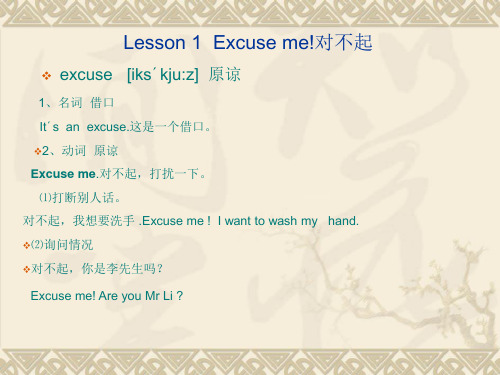
前元音:[i:] [i] [e] [æ ]
❖ [i:]-----长元音,舌头前部抬的最高,牙齿近乎 全合,舌尖抵下齿,嘴唇像两旁伸
❖
开,呈扁平型,做微笑状。
e -----me he we
ee-----see bee green need
ea-----tea eat seat lead
ie -----believe grief
❖前元音小结: 英语中有四个前元音,即:[i:] [i] [e] [æ ]
发前原因时必须注意:
①舌尖要抵住下齿。
②舌前部向硬颚部分抬起。
③双唇不要收圆,发[i:] [i] [e] 时双唇平展, 发[æ ]时口型要张大,扁唇。 ④唇形舌位保持不变,否则就要发成双元音。
Lesson 1 Excuse me!对不起
❖ excuse [iks´kju:z] 原谅
1、名词 借口 It´s an excuse.这是一个借口。 ❖2、动词 原谅 Excuse me.对不起,打扰一下。 ⑴打断别人话。 对不起,我想要洗手 .Excuse me ! I want to wash my hand. ❖⑵询问情况 ❖对不起,你是李先生吗?
I love you very much.我非常地爱你。
Lesson 1 Excuse me!对不起
❖ Lesson 1 ❖ 1 excuse [ik'skju:z] v.原谅 ❖ 2 me [mi:, mi] pron.我(宾格) ❖ 3 yes [jes] ad.是的 ❖ 4 is [iz, s, z, əz] v.be动词现在时第三人称单数 ❖ 5 this [ðis] pron.这 ❖ 6 your [jə:, jɔ:, jər, jɔ:r] 你的,你们的 ❖ 7 handbag ['hæ ndbæ g] n.(女用)手提包 ❖ 8 pardon ['pɑ:dən] int.原谅,请再说一遍 ❖ 9 it [it] pron.它 ❖ 10 thank you 感谢你(们) ❖ 11 very much 非常地
lesson 1

Describe the pictures
stomach His _________hurts.
She have got a __________. high fever
pain I have a _______in my shoulder.
She looks______, pale she is sick.
Work in pairs. Make up a dialogue.
4
Let me take your Nothing serious. I hope How long have you been temperature. Oh, you What’s wrong with you? you feel better soon. like this? have a fever.
►
2.What does Danny regret doing?
►
3.How do they get to the hospital?
►
4.What does Dr.Ling ask Danny to do?
Task two
Name
what’s wrong with him What doctor says
Choose the correct words to complete the sentences. 3 1. The boy looks so pale that there is no ___ in his face. A. colour B. fear 2. we’d better take an X-ray. With a ____ picture, the doctor will easily see the problem. A. clear B. colourful
新概念英语第一册课后练习题答案:Lesson 1
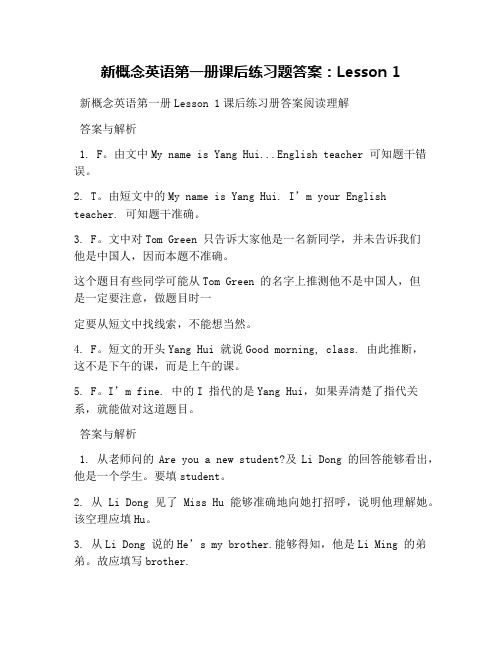
新概念英语第一册课后练习题答案:Lesson 1新概念英语第一册Lesson 1课后练习册答案阅读理解答案与解析1. F。
由文中My name is Yang Hui...English teacher 可知题干错误。
2. T。
由短文中的My name is Yang Hui. I’m your English teacher. 可知题干准确。
3. F。
文中对Tom Green 只告诉大家他是一名新同学,并未告诉我们他是中国人,因而本题不准确。
这个题目有些同学可能从Tom Green 的名字上推测他不是中国人,但是一定要注意,做题目时一定要从短文中找线索,不能想当然。
4. F。
短文的开头Yang Hui 就说Good morning, class. 由此推断,这不是下午的课,而是上午的课。
5. F。
I’m fine. 中的I 指代的是Yang Hui,如果弄清楚了指代关系,就能做对这道题目。
答案与解析1. 从老师问的Are you a new student?及Li Dong 的回答能够看出,他是一个学生。
要填student。
2. 从Li Dong 见了Miss Hu 能够准确地向她打招呼,说明他理解她。
该空理应填Hu。
3. 从Li Dong 说的He’s my brother.能够得知,他是Li Ming 的弟弟。
故应填写brother.4. Ling Dong 说的I’m twelve.已经明确地告诉我们,他12 岁了。
要填twelve。
5. 从Li Dong 问三班就能看出,他是三班的学生。
理应填Three。
英汉翻译1. Is this your handbag?2. Is this your pen?3. Is this your pencil?4. Excuse me, what time is it?5. Sorry, I beg your parden.6. Is this your coat?7. Is this your suit?8. This is not my watch.。
新概念英语第一册课文原文Lesson 1-Lesson 9(中英文)
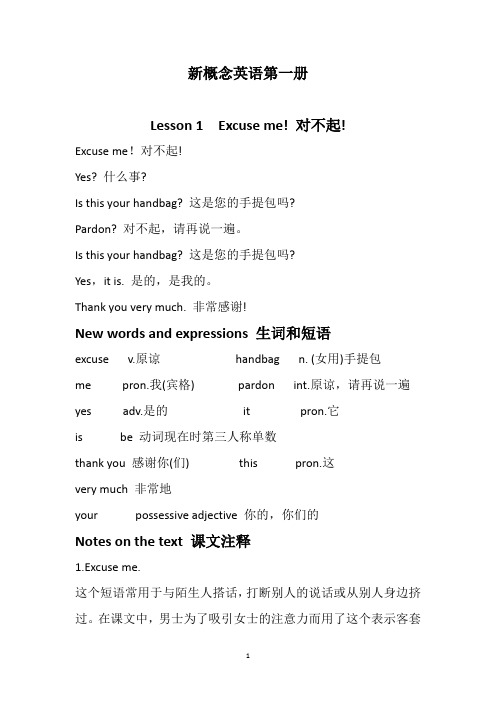
新概念英语第一册Lesson 1 Excuse me! 对不起!Excuse me!对不起!Yes? 什么事?Is this your handbag? 这是您的手提包吗?Pardon? 对不起,请再说一遍。
Is this your handbag? 这是您的手提包吗?Yes,it is. 是的,是我的。
Thank you very much. 非常感谢!New words and expressions 生词和短语excuse v.原谅handbag n. (女用)手提包me pron.我(宾格) pardon int.原谅,请再说一遍yes adv.是的it pron.它is be 动词现在时第三人称单数thank you 感谢你(们) this pron.这very much 非常地your possessive adjective 你的,你们的Notes on the text 课文注释1.Excuse me.这个短语常用于与陌生人搭话,打断别人的说话或从别人身边挤过。
在课文中,男士为了吸引女士的注意力而用了这个表示客套的短语。
2.Pardon?全句为I beg your pardon. 意思是请求对方把刚才讲过的话重复一遍。
Lesson 3 Sorry, sir. 对不起,先生。
My coat and my umbrella please. 请把我的大衣和伞拿给我。
Here is my ticket. 这是我(寄存东西)的牌子。
Thank you, sir. 谢谢,先生。
Number five. 是5号。
Here's your umbrella and your coat. 这是您的伞和大衣。
This is not my umbrella. 这不是我的伞。
Sorry, Sir. 对不起,先生。
Is this your umbrella? 这把伞是您的吗?No, it isn't. 不,不是!Is this it? 这把是吗?Yes, it is. 是,是这把。
《Lesson1 》 教学设计
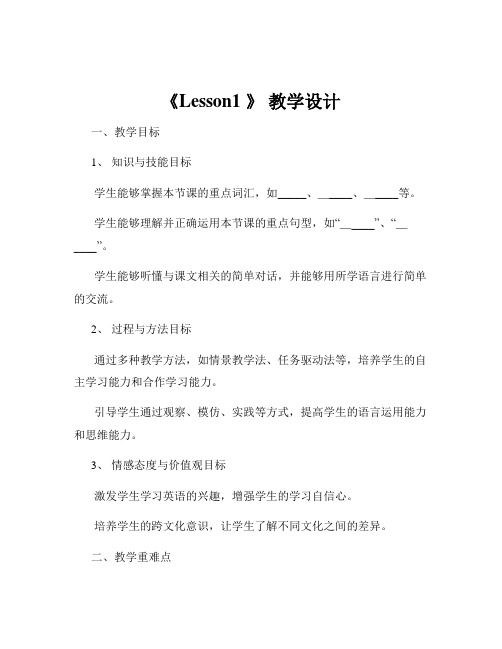
《Lesson1 》教学设计一、教学目标1、知识与技能目标学生能够掌握本节课的重点词汇,如_____、_____、_____等。
学生能够理解并正确运用本节课的重点句型,如“_____”、“_____”。
学生能够听懂与课文相关的简单对话,并能够用所学语言进行简单的交流。
2、过程与方法目标通过多种教学方法,如情景教学法、任务驱动法等,培养学生的自主学习能力和合作学习能力。
引导学生通过观察、模仿、实践等方式,提高学生的语言运用能力和思维能力。
3、情感态度与价值观目标激发学生学习英语的兴趣,增强学生的学习自信心。
培养学生的跨文化意识,让学生了解不同文化之间的差异。
二、教学重难点1、教学重点重点词汇的发音、拼写和用法。
重点句型的结构和运用。
2、教学难点如何让学生在实际情境中灵活运用所学词汇和句型进行交流。
帮助学生理解一些较难的语法点,如_____。
三、教学方法1、情景教学法创设生动有趣的情景,让学生在真实的语境中学习和运用语言。
2、任务驱动法布置明确的任务,让学生在完成任务的过程中提高语言能力。
3、游戏教学法通过游戏激发学生的学习兴趣,巩固所学知识。
4、合作学习法组织学生进行小组合作学习,培养学生的合作意识和交流能力。
四、教学过程1、导入(5 分钟)通过播放一段与本节课主题相关的英语视频或展示一些图片,引起学生的兴趣,导入新课。
2、词汇学习(10 分钟)展示本节课的重点词汇,通过图片、实物、动作等方式帮助学生理解词汇的含义。
带领学生朗读词汇,纠正发音。
让学生进行词汇拼写练习。
3、句型学习(10 分钟)呈现重点句型,讲解句型的结构和用法。
创设情境,让学生模仿例句进行句型操练。
4、课文学习(15 分钟)播放课文录音,让学生边听边理解课文内容。
逐句讲解课文,解答学生的疑问。
让学生分角色朗读课文,加深对课文的理解。
5、语言运用(15 分钟)创设真实的语言情境,如购物、旅游等,让学生运用所学词汇和句型进行对话练习。
- 1、下载文档前请自行甄别文档内容的完整性,平台不提供额外的编辑、内容补充、找答案等附加服务。
- 2、"仅部分预览"的文档,不可在线预览部分如存在完整性等问题,可反馈申请退款(可完整预览的文档不适用该条件!)。
- 3、如文档侵犯您的权益,请联系客服反馈,我们会尽快为您处理(人工客服工作时间:9:00-18:30)。
Which of the following people do you think arrived in America first? a. Christopher Columbus
b. Ancient Romans
c. Chinese d. Vikings
This painting shows Viking raider in about the year 1100
3. achieve (v.)
= succeed / be successful
achieve the goal 达到目的
set sail from A地 for B地
4. long before “在之前很久”
They achieved this long before Columbus ever set sail.
Find the words in the text that match most closely with the meaning of the words below
1. finally 2. succeed 3. never heard of 4. start a sea journey 5. looking for 6. sea journey 7. now 8. based on 9. find out 10. carry out
trip 一般指时间短、距离近的“旅行、远足”, 也可以指长途旅行。在非正式用语中可代替 journey。只作名词。例如: We made a boat trip to the island last week and had a good time. I will be on a trip to / journey to the south next summer holiday. tour 着重指旅行线路比较曲折,常表示“(周游 各地的)参观、访问、(巡回)旅游、视察、购 物、演出”等意思。可作动词和名词。例如: I will tour the world in the future. My father has gone down-town on a shopping tour.
他们在哥伦布到达此地很久之前就已经来 过这儿。
before long = soon
“不久”
孩子,很快我就会来看你。
I shall see you before long, my boy.
☆It be + 时间 + before “ 过了多久”
过了很久,我才睡着。
It was a long time before I fell asleep.
a large island in North Atlantic Ocean, near Northeastern Canada
Newfoundland a large island in Eastern Canada
Read the passage. Then complete the table below about the Vikings’ major discoveries.
a large island in Eastern Canada
Scandinavia
Scandinavia: an area of the North Europe consisting of Norway, Sweden, Denmark, Iceland and Finland.
a country in the North Atlantic
= based on
The price changed according to the season.
8. be forced to do sth. 被迫做某事
主动: force sb. to do sth. The workers were forced to work at least 16 hours a day.
Unit 7 The Sea
Columbus was a Spanish sailor. He made four voyages . He is famous all over the world now. People consider him to have discovered America first. Do you think so?
explore (v.) ----- explorer (n.)
2. Viking voyage to America
voyage (n.) = sea journey ☆ 区分: voyage, journey, tour, trip, travel
这一组词都有“旅行”的意思,但各词的含义有所不同。 journey指从一地到另一地,通常指陆地上的远距离 “旅行”,有时也可以表示经常走的或长或短的“路程” 只作名词。例如: I took a journey from Beijing to Shanghai last year. -- How long is your journey to school? --Only about 10 minutes. voyage主要指远距离的水上旅行,也可以指空中旅行 意思为“航海、航空、航行”等。只作名词。例如: She usually gets seasick during the voyage. They made a voyage across the Pacific by air.
unknown land
blown off course
An island (now planned Leif and known as the year 1002 Newfoundland) the trip Biarni
1. Why did Eric the Red leave Iceland? He was forced to leave Iceland because he got into trouble for a murder he had committed. 2. Who was Biarni looking for when he was blown to an unknown land?
Water skiing is as exciting as wind surfing.
7. according to 根据, 依照
☆ 后面接短语,不能接句子 根据课文叙述,北欧海盗首先发现美洲。 According to the text, Vikings first discovered America. 价格根据季节变化。
This might be the oldest map of North America. Some people believe the Vikings drew it. They also think Columbus may have used it to find the New world.
travel作“旅行、游历”解,一般表示从一地到另一地 旅行这一总的概念。常指长时间、远距离的“旅行”。 尤指出国旅行。可作动词和名词。其复数形式意思为 “旅游笔记”、“游记”。例如: At present, many people are fond of travel in their spare time. I am reading a book about the travel to North Pole. They came home after years of foreign travel. Light travels faster than sound.
Read to Learn
Greenland Scandinavia Newfoundland Iceland
2.Match the words with their explanations.
Scandinavia
斯堪的纳维亚
a large island in the North Atlantic Ocean, near Northeastern Canada
eventually achieve unknown set sail in search of voyage present-day according to discover commit
1. The spirit of explorers
spirit (n.) 我们应该学习雷锋精神。
We should learn from Lei Feng’s spirit.
☆ It+be+ not +long +before “不久就……”
不久我们就会见面的。
It won’t be long before we see each other.
5. further
是far 的比较级,一般指程度深远 而farther 一般指路程遥远
6. as many as
多达……
as many as + 可数名词 as much as + 不可数名词 史密斯先生一天能吃多达五顿饭。 Mr. Smith can eat as many as five meals a day. A+ as +形容词+ as +B用于同级之间的比较 滑水跟滑浪风帆都一样刺激。
an area of North Europe consisting of Norway, Sweden, Denmark, Iceland and Finland a country in the North Atlantic
Greenland
格陵兰
Newfoundland
纽芬兰
Iceland
冰岛
journey、voyage、trip、tour、travel 填空 voyage 1.The ________ from America to France used to take two months. 2.How did you enjoy your ________ in Europe? travels 3.I go to work by train, and the trip/journey takes half an hour. ______ 4.He made a five-month _______ tour of India and the Far East. 5.He took us on a _____ of his tour new house.
